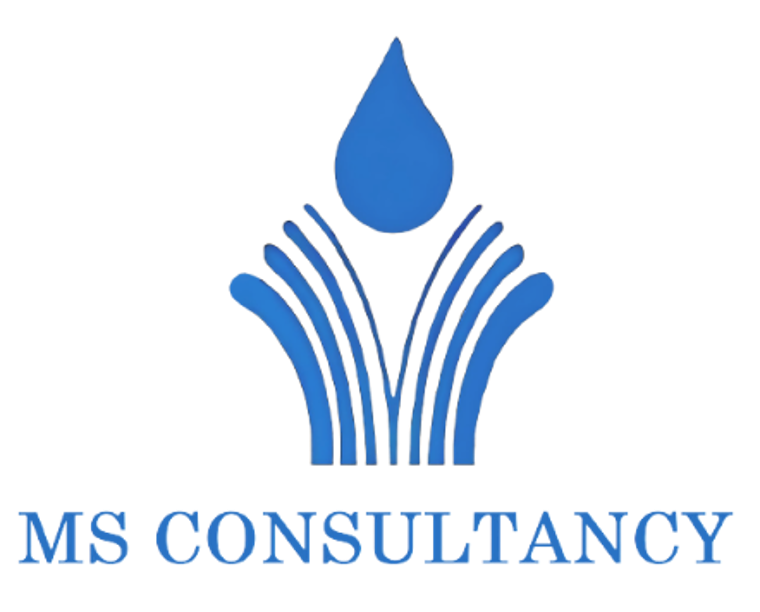Solid Waste & Wastewater Projects
MS Consultancy excels in environmental sustainability through innovative solid waste and wastewater projects. Specializing in both solid and liquid waste, we design sewer networks, wastewater treatment plants, and storm drainage systems in major Ethiopian cities. Notable achievements include the Addis Ababa City Eastern Sewerage Catchment project, where we design sewer networks and implement wastewater treatment for a population exceeding one million, making it one of the largest sanitation projects in Ethiopia. Our expertise extends to sanitary landfill projects, as well as the design and construction supervision of liquid waste management systems, demonstrating our commitment to environmental responsibility.
General/Selected Experience
Consultancy Service for Rehabilitation and Additional Works for Chefe Wastewater Treatment Plant in Addis Ababa
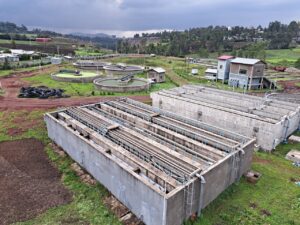
The consultancy service for the rehabilitation and additional works of the Chefe Wastewater Treatment Plant (WwTP) in Addis Ababa is a two-phase initiative aimed at fortifying water management in the Chefe Sub-Catchment. Phase I involves a thorough study and detailed design to pinpoint the necessary rehabilitation and additional enhancements. Emphasis is placed on crafting comprehensive tender documents and facilitating the tendering process. Subsequently, Phase II transitions to construction supervision and contract administration, ensuring the systematic improvement of the Chefe Wastewater Treatment Plant.
Integrated Citywide Sanitation Plan and Wastewater Management System for Harar City

The project aims to develop an Integrated Citywide Sanitation Plan for Harar City through comprehensive consulting services. The objectives include assessing the current state of fecal sludge and wastewater management systems across all components of the sanitation service chain. This entails a thorough review and analysis of household types, service coverage, and technical and operational aspects related to containment, emptying, transport, treatment, and reuse/disposal. The feasibility study will inform the detailed design, which encompasses the planning of a sewer system, fecal sludge treatment, and wastewater treatment plant tailored to the unique needs and challenges of Harar City.
Consulting services for the study, sanitation assessments, feasibility studies, and the design and construction of a Wastewater Treatment Plant (WWTP) in the Addis Ababa Eastern Catchment


The Consulting Services for the SUWSSP project in Addis Ababa Eastern Catchment adopts a Design, Build, and Operate (DBO) approach to enhance water and sanitation services. The primary objectives encompass the improvement of sanitation and water supply services in Addis Ababa and 22 secondary cities across Ethiopia. The project’s components include a review of available data, feasibility studies, and the design and construction of a Wastewater Treatment Plant (WWTP). The process involves assessing present and future wastewater production, area coverage rates, and existing collection systems. Through data collection surveys and investigations, the project aims to address data gaps, determine the capacity of sewer lines and WWTPs, and propose integration strategies with existing systems. This holistic approach contributes to the operational efficiency and sustainability of water and sanitation services in the targeted regions.
Decentralized Wastewater Treatment Plants for 12 Condominium Housing Sites: Detail Design and Construction Supervision


The Consultancy Service for this project encompasses a comprehensive approach to address wastewater management for 12 Condominium Housing sites. The tasks involve quantifying wastewater generation, estimating sanitary loads, and conducting a preliminary design for Multiple-Criteria Analysis of seven Decentralized Wastewater Treatment Plants (WWTPs). The preliminary design includes various technologies such as Trickling Filters, Anaerobic Baffled Reactors, Aerated Lagoons, and more, with capacities ranging from 500m3 per day up to 9,000m3 per day.
The project also entails checking the feasibility of connecting Condominium sites to centralized WWTPs like Chefe, Kaliti, Kotebe, and Kiteme. Additionally, the design includes sewerage lines extending up to 5 km with diameters reaching 600 mm. The overarching goal is to establish decentralized wastewater treatment infrastructure, ensuring the efficient and sustainable management of wastewater for the specified residential areas. Environmental impact assessment, social impact assessment, and tender document preparation are integral components of this initiative, reflecting a commitment to comprehensive sanitation solutions.
Integrated Sanitation Planning for Jimma and Nekemte Cities: A Comprehensive Approach
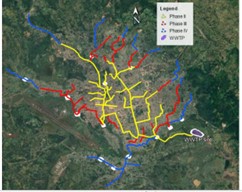

In collaboration with CES, the project aimed at developing an Integrated Citywide Sanitation Plan for Jimma and Nekemte Cities. The feasibility study included a thorough assessment of existing sanitation conditions, proposing technical options for Citywide Inclusive Sanitation (CWIS). The plan incorporated considerations for central and decentralized wastewater treatment, on-site sanitation solutions, and conducted environmental and social impact assessments aligning with the Environmental and Social Management Framework. Financial analysis ensured economic viability, accompanied by a Capacity Building Plan. The project concluded with preliminary and detailed designs, tender documents, and client capacity building, emphasizing a holistic and sustainable approach to wastewater management.
Consulting Services for Detailed Design, Tender Documents and Construction Supervision for Sanitation System of Hargeisa Town, Somaliland

Financed by KfW (German Financial Cooperation), this project focuses on the comprehensive enhancement of Hargeisa Town’s sanitation system. The consulting services encompass detailed design, tender document preparation, and construction supervision. The wastewater treatment facilities entail a range of components such as sludge drying beds, anaerobic ponds, aerobic ponds, maturation ponds, facultative ponds, ablution blocks, and waste composting systems. Beyond infrastructure development, the project includes a crucial element of capacity building for the client’s staff members, ensuring sustainable and effective management of the sanitation system in Hargeisa Town, Somaliland.
Award-Winning Sustainable Wastewater Management System in South Sudan
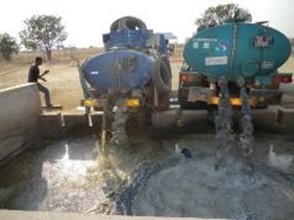
This groundbreaking project involves a comprehensive study and assessment of the existing water supply and sewage system. The innovative wastewater management system utilizes sedimentation, aeration, filtration, and solar disinfection techniques to treat sewage effectively. The treated wastewater is then recycled for multiple purposes, including car washing, gardening, and groundwater recharge. Notably, this environmentally friendly approach has received recognition with an award, and detailed information about the project can be found on the World Bank’s website in South Sudan. The project scope also includes the design of the wastewater treatment system and construction supervision to ensure its successful implementation.
Design and Supervision of Three Sewage Treatment Plants in Tashkent, Uzbekistan
This project involves the rehabilitation, supply, installation, and commissioning of electromechanical components for three wastewater treatment plants in Tashkent, Uzbekistan. With a combined capacity of approximately 1.7 million cubic meters per day, the plants undergo a comprehensive upgrade. The primary treatment system, sewage pumping, secondary treatment system, and activated sludge-based biological treatment are integral elements of the project. The scope extends to the sludge digestion system and sewer infrastructure, featuring pipelines with diameters of 1000 and 1200 mm, totaling 75 km in length. Additionally, new pumping stations are installed to enhance the efficiency and functionality of the sewage treatment plants, contributing to sustainable wastewater management in the region.
Adigrat City Design and Supervision of Liquid Waste Management System
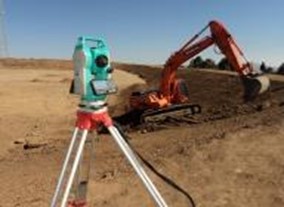
The project focuses on the comprehensive planning, study, and design of a Liquid Waste Management System for Adigrat City. Encompassing both domestic and industrial wastewater, the system is designed to address collection, transportation, and treatment aspects. The scope involves the intricate planning of onsite liquid waste management, featuring the design of septic tanks, private/communal latrines, and drying beds. Additionally, the system incorporates essential components such as evaporation lagoons and waste stabilization ponds. Through supervision, this initiative aims to enhance the city’s capacity for sustainable and efficient liquid waste management, ensuring environmental health and community well-being.
Juba wastewater managmemnet system - design and construction supervision

This project involves the design and construction supervision of a sustainable wastewater management system in Juba, funded by the World Bank. The system treats sewage through sedimentation, aeration, filtration, and solar disinfection, ensuring safe water reuse for car washing, gardening, and groundwater recharge. By incorporating environmentally friendly treatment processes, the project enhances urban sanitation, promotes water conservation, and supports the sustainable development goals for improved public health and environmental protection.
Dessie Liquid Waste Treatment Plant Design and Construction Supervision
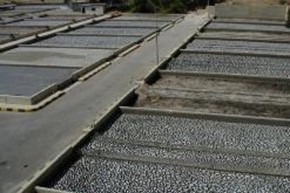
This comprehensive project focuses on the design and construction supervision of the Sanitary Liquid Waste Treatment Plant in Dessie. The system is dedicated to managing domestic sewage efficiently. The sewage undergoes a process, starting with collection and initial treatment in appropriately sized parallel septic tanks and pit latrines. The partially digested waste is then transported, utilizing vacuum trucks and occasionally sewer systems, before reaching the final treatment stages. These include drying beds, evaporation lagoons, and waste stabilization ponds. The project aims to implement a sustainable and effective solution for the treatment and disposal of liquid waste in Dessie, ensuring environmental protection and public health.
Addis Ababa Eastern Catchment Sewerage Design Review and Detailed Design Work
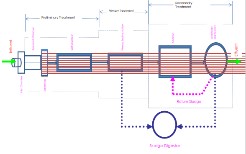
This project, catering to a substantial population of 1 million and handling a daily sewage production of 117,060m³, involves an intricate sewerage system. Comprising 45 km of sewer lines ranging from 300 to 2,000 mm in diameter, the system is designed to meet the sanitary, hydraulic, and structural needs. The core of the wastewater treatment includes an activated sludge-based system with primary treatment components such as screening, grit removal, and settling. Following this, a biological aeration process, secondary settling tank, and sludge digester are employed, with subsequent sludge dewatering for utilization in sludge drying beds. The project extends its reach to include the design of access roads, residential, and office buildings, showcasing a holistic approach to sanitation and infrastructure development in the Eastern Catchment of Addis Ababa.
Design and Construction Supervision for Dire Dawa City Liquid Waste Management System

The Dire Dawa City Liquid Waste Management System project involves the design and construction supervision of a comprehensive sanitary waste management infrastructure. The system is engineered to collect, treat, and dispose of sanitary waste through strategically designed parallel septic tanks and pit latrines. The transport of sewage is efficiently carried out using vacuum trucks and, in some instances, through a network of sewers. The final treatment phase involves innovative methods such as drying beds, evaporation lagoons, and waste stabilization ponds. An environmentally conscious aspect of the project includes the recovery of dried cakes as fertilizers for agricultural uses. The implementation of this system is pivotal for maintaining a healthy environment and sustainable waste disposal practices in Dire Dawa City.
Design and Construction Supervision for Kombolcha City Liquid Waste Management System

The Kombolcha City Liquid Waste Management System project entails the design and construction supervision of a comprehensive sanitary waste management infrastructure. The system is engineered to collect, treat, and dispose of sanitary waste through strategically designed parallel septic tanks and pit latrines. The transport of sewage is efficiently carried out using vacuum trucks and, in some instances, through a network of pipe sewers. The final treatment phase involves innovative methods such as drying beds, evaporation lagoons, and waste stabilization ponds. Through this project, the aim is to establish a robust and sustainable liquid waste management system that ensures the proper handling and disposal of sanitary waste in Kombolcha City. The diligent implementation of this system contributes significantly to environmental preservation and public health in the region.
Dessie Design and Construction Supervision of Dessie Storm Sewer System Project
The Dessie Storm Sewer System Project involves the design and construction supervision of an open channel drainage and concrete sewer system. This comprehensive system includes a substantial retaining wall designed to shield a population of over 8,000 from the perils of stormwater flooding, safeguarding lives and properties. The implementation of various sewer appurtenances, including manholes, drains inlets, outlets, and connection structures, is an integral aspect of the project’s strategy to enhance stormwater management and protect the community from potential risks. The careful execution of this project aims to mitigate the impact of stormwater flooding in the Dessie region and contribute to the overall safety and well-being of the residents.
Design and Construction Supervision for Butajira Flood Relief and Surface Water Dispersal Sewer System
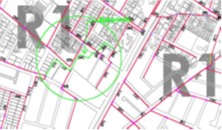
The project entails the design and construction supervision of the Butajira Flood Relief and Surface Water Dispersal Sewer System. The storm sewer system incorporates open channels, uPVC, and concrete sewer pipes strategically designed to manage rainfall runoff and other drainage efficiently. This system utilizes a combination of underground pipes and open ditches, discharging untreated water into local streams and rivers. Various sewer appurtenances, including drains inlets, outlets, and connections, are strategically integrated, aligning with domestic sewer lines and strategically located in curbs and low-lying outdoor areas. The project focuses on addressing flood relief and enhancing the effective dispersal of surface water in the Butajira region.
Hawassa Storm Water Treatment Design and Supervision
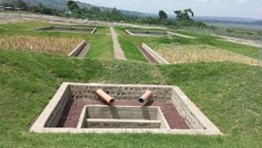
The project involves the creation of a constructed wetland designed to treat municipal, industrial wastewater, and greywater carried by stormwater runoff. Serving as a pilot plant, its purpose is to mitigate the direct flow of such wastes into Lake Hawassa. The performance of the treatment plant has demonstrated success in terms of technical compatibility. This initiative aims to address environmental concerns by implementing effective wastewater treatment measures to protect Lake Hawassa and its surrounding ecosystem.
Hawassa Storm Water Sewerage Master Plan Development and Storm Sewer System Development

The project entails the creation of a comprehensive master plan for the storm sewer system in Hawassa City. The design and construction supervision involve the implementation of open channels, rectangular and circular concrete sewer pipes, as well as uPVC sewers to effectively manage rainfall runoff and sewage. The system includes underground pipes, open ditches, and discharge points into local streams, rivers, and surface water bodies. Sewer appurtenances, such as manholes, drains, inlets, outlets, and connections, align with domestic sewer lines, integrating into curbs, low-lying outdoor areas, and older buildings with basement floor drains connected to the storm sewer system. This project aims to develop a resilient and efficient stormwater management infrastructure for Hawassa City.
Dilla Urban Storm Drainage Rehabilitation Project Design and Construction Supervision

The Dilla Urban Storm Drainage Rehabilitation Project focuses on the design and construction supervision of a storm sewer system, utilizing open channels and sewer pipes. This system is engineered to manage rainfall runoff and other drainage effectively. The runoff is conveyed through underground concrete pipes, DCI pipes, and open ditches, with discharge points leading into local streams, rivers, and other surface water bodies. Components such as storm drain inlets, outlets, connections, and sewer lines align with domestic infrastructure, including those integrated into curbs and low-lying outdoor areas, offering a comprehensive solution for stormwater management in urban areas.
Bishoftu Town Storm Water Drainage Enhancement Project: Design and Construction Supervision

The Bishoftu Town Storm Water Drainage Enhancement Project involves the design and construction supervision of a storm sewer system, incorporating open channels and concrete sewer pipes. This system is strategically planned to effectively manage rainfall runoff and other drainage, transporting it through underground pipes and open ditches. The project aims to prevent untreated discharge into local streams, rivers, and surface water bodies. Key components include storm drains, inlets, outlets, connections, and sewer appurtenances such as manholes, screens, drop manholes, and sluice gates, ensuring a comprehensive approach to stormwater management.
Revamping Harar Brewery Waste Water System: Study, Design, and Supervision

The project focuses on the comprehensive study, design, and supervision for the revitalization of the Harar Brewery Waste Water System. The revamping process includes upgrading the preliminary treatment stage, incorporating screeners of varying sizes (coarse, medium, or fine) along with Grit Chambers and Skimming Tanks. This phase aims to efficiently remove greasy and oily materials from both domestic and industrial wastes. The Primary Treatment involves sedimentation tanks, facilitating the settling of suspended matters. The secondary or Biological Treatment System features trickling filters, addressing odor concerns and ensuring environmentally friendly waste processing. The overarching goal of this initiative is to enhance the brewery’s waste management infrastructure, aligning with modern environmental standards and promoting sustainable practices within the community.
Bahir-dar City Storm Sewerage Design and Supervision Project
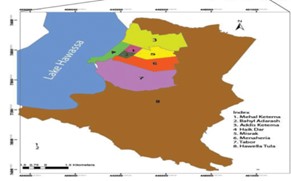
The project focuses on the comprehensive study, design, and supervision for the revitalization of the Harar Brewery Waste Water System. The revamping process includes upgrading the preliminary treatment stage, incorporating screeners of varying sizes (coarse, medium, or fine) along with Grit Chambers and Skimming Tanks. This phase aims to efficiently remove greasy and oily materials from both domestic and industrial wastes. The Primary Treatment involves sedimentation tanks, facilitating the settling of suspended matters. The secondary or Biological Treatment System features trickling filters, addressing odor concerns and ensuring environmentally friendly waste processing. The overarching goal of this initiative is to enhance the brewery’s waste management infrastructure, aligning with modern environmental standards and promoting sustainable practices within the community.
Lalibela Water Supply and Sanitation Project: Design and Construction Supervision
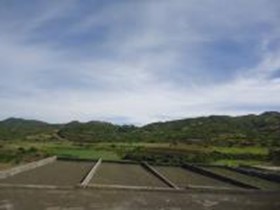
The project entails the design and construction supervision of Lalibela’s water supply and sanitation system, integrating both domestic and industrial wastewater management. The comprehensive system involves the collection and transportation of wastewater, utilizing vacuum trucks, drying beds, waste stabilization ponds, and a sanitary landfill. As a crucial component of the broader water supply and solid waste management initiative, this project is geared towards enhancing the overall environmental and public health conditions in Lalibela.
Semera-Logia Solid Waste Management System: Design & Construction Supervision
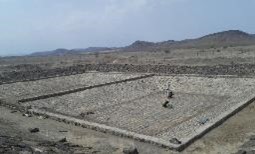
The project aims to elevate the quality of waste management in Semera-Logia City through the design and construction supervision of a comprehensive system. Focused on enhancing the lives of residents, the initiative includes the establishment of key structures such as a sanitary landfill and an advanced leachate treatment facility. With a strong commitment to resource recovery and land reclamation, this project represents a crucial stride toward sustainable and effective waste management practices in Semera-Logia City.
Debre Markos City Solid Waste Management Project: Study, Design & Construction Supervision
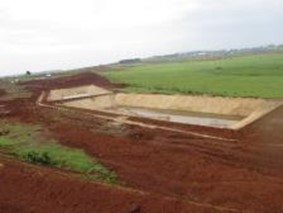
The comprehensive initiative for the Study, Design, and Construction Supervision of Debre Markos City Solid Waste Management Project is geared towards a significant improvement in the city’s waste management scenario. The project envisions the establishment of advanced infrastructure for solid waste management, primarily featuring a state-of-the-art sanitary landfill. This landfill is designed not only for effective waste containment but also includes a leachate treatment system. The emphasis on land reclamation underscores the project’s commitment to sustainable practices, aiming to enhance the environmental integrity of Debre Markos City. Through innovative solutions and rigorous construction supervision, this project is set to revolutionize the solid waste management landscape, ensuring a cleaner and healthier environment for the city’s residents.
Jimma Solid Waste Management System: Innovative Design and Supervision
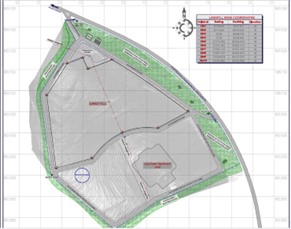
The Jimma Solid Waste Management System project is characterized by its dynamic design and construction supervision, aiming to establish a robust waste management infrastructure. The project incorporates an efficient and organized system for the collection, transportation, and disposal of solid waste. The disposal phase is particularly focused on the utilization of sanitary landfills designed not only for waste containment but also for land reclamation and resource recovery. This holistic approach reflects a commitment to environmental sustainability, ensuring that the waste generated in Jimma is managed responsibly, contributing to the well-being of the community and the preservation of natural resources.
Adigrat Solid Waste Management System: Integrated Study, Design, and Supervision
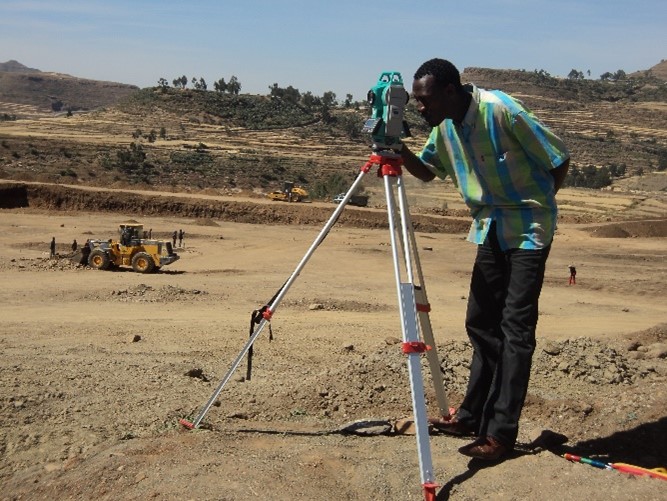 The Adigrat Solid Waste Management System project is a comprehensive undertaking that involves planning, detailed study, innovative design, and effective construction supervision. The primary focus is on establishing a state-of-the-art sanitary landfill as the core of a holistic waste management system. This integrated approach encompasses the development of a systematic waste management process involving collection, transportation, and efficient garbage compaction using appropriate machinery. Key infrastructures within the project include the construction of a sanitary landfill, accompanied by a sophisticated leachate treatment system designed for land reclamation. The emphasis on integrated waste management reflects a commitment to environmental sustainability, efficient waste handling, and the overall well-being of the Adigrat community.
The Adigrat Solid Waste Management System project is a comprehensive undertaking that involves planning, detailed study, innovative design, and effective construction supervision. The primary focus is on establishing a state-of-the-art sanitary landfill as the core of a holistic waste management system. This integrated approach encompasses the development of a systematic waste management process involving collection, transportation, and efficient garbage compaction using appropriate machinery. Key infrastructures within the project include the construction of a sanitary landfill, accompanied by a sophisticated leachate treatment system designed for land reclamation. The emphasis on integrated waste management reflects a commitment to environmental sustainability, efficient waste handling, and the overall well-being of the Adigrat community.
Bishoftu Solid Waste Management Project: Holistic Study, Design, and Supervision
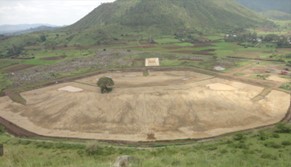
The Bishoftu Solid Waste Management Project is a multifaceted initiative encompassing a comprehensive study, design, and construction supervision. The primary objective is to establish an efficient system for the collection and transportation of domestic and other solid waste generated in the town. This waste is systematically managed, ensuring it reaches a designated sanitary landfill. The landfill operation involves the compaction of solid matter, contributing to land reclamation efforts. Additionally, a sophisticated leachate management system is integrated, with a dedicated drying pond to prevent groundwater pollution. The project is characterized by a holistic approach to waste management, emphasizing environmental protection, efficient operations, and adherence to sustainable practices for the benefit of the community and the surrounding ecosystem.
Gondar City Solid Waste Management System: Integrated Design and Supervision
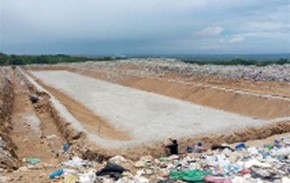
The project involves the comprehensive design and construction supervision of Gondar City’s Solid Waste Management System, emphasizing an advanced waste disposal facility. This facility employs a strategic methodology, including the layering of compacted garbage covered with earth layers. The selection of a sanitary landfill site is thorough, considering factors such as its location above the water table, geological stability, aesthetic values, and a plan for future land reclamation. The approach aims to ensure the facility’s capacity is optimally utilized, and upon reaching its limit, a carefully planned cap is applied to close the site. The project prioritizes environmental sustainability, geological stability, and aesthetics, reflecting a commitment to responsible waste management practices.
Dire Dawa Solid Waste Management Project: Comprehensive Study, Design, and Construction Supervision
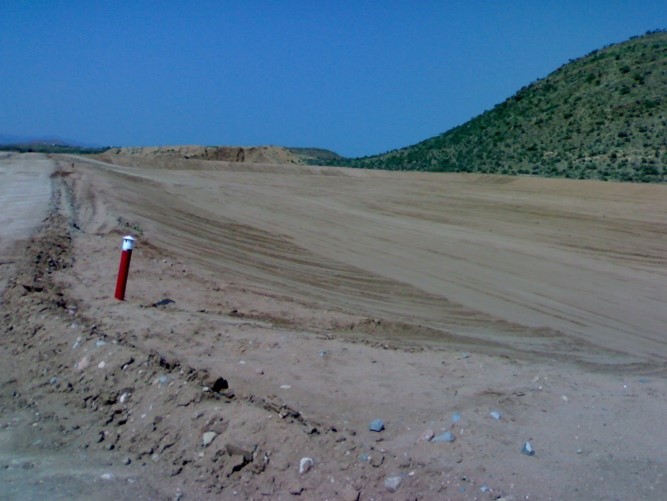
The Dire Dawa Solid Waste Management Project involves the study, design, and construction supervision of a cutting-edge waste disposal facility. This facility employs a strategic approach to manage solid waste, incorporating layers of compacted garbage covered by earth layers. The site selection for the sanitary landfill is crucial, considering factors like its location above the water table, geological stability, aesthetic values, and a plan for future land reclamation. The project encompasses a thorough study and design of the solid waste management system, an Environmental and Social Impact Assessment (ESIA) and safeguards study, geotechnical and soil investigation studies, as well as the preparation of bidding documents. The subsequent phase involves vigilant construction supervision, ensuring the successful implementation of the waste management system while adhering to the highest standards of environmental sustainability and social responsibility.
